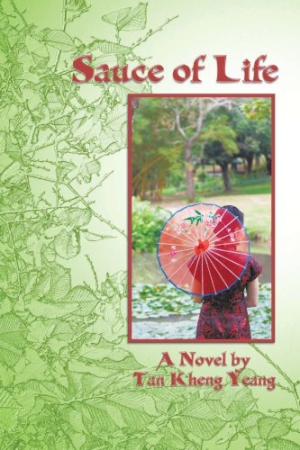Sauce of Life
Sauce of Life is a family saga set in 1930s British Malaya, where Lai Pek, a middle-aged Chinese businessman, leads a prosperous life with his wife and five children. Pleased with his hard-earned accomplishments and certain of his narrow, capitalist view of the world, Lai Pek is ill prepared for the challenges he must face when a sophisticated businessman arrives in his thriving community and begins a successful new enterprise. Along with the arrival of this unwelcome adversary, Lai Pek must grapple with the aftermath of a tragedy at his rubber plantation as well as a threat that darkens the lives of those he loves most.
Tan Kheng Yeang offers readers an inside view of Malay business and family life at an intriguing point in history. Local industries, including rubber, are incredibly profitable, and the prosperous businesses that spring from these opportunities create a fictional landscape rife with the possibility of drama. The novel tries to capture the tensions among competing businessmen and the repercussions of a widening gap between rich and poor. However, the prose lacks movement, instead plodding from one scene to the next due to unnecessary vignettes and overly long scenes.
The prose is simple and direct and lends itself well to an easy, rather natural storytelling style. However, in an effort to pinpoint an exact emotion or countenance, the author resorts to overwriting, burdening sentences with too many descriptors. Characters often have emotion pressed onto them in the form of adverbs that are meant to clarify speech (“he concluded complacently”) or overwrought descriptions (“said Lai Pek in undignified confusion”) instead of allowing the characters to develop through action or reflection. This results in characters that are flat and unconvincing.
Sauce of Life offers interesting political and social commentary on the ongoing tension between Eastern and Western values. Through intimate family scenes that appear as vignettes throughout the novel, the author creates a portrait of a country that is coming of age, negotiating traditional values of family and honor against an infiltration of Western ideals that focus on individual agency. A discussion of marriage for Lai Pek’s eldest son, Sum Goh, exemplifies this opposition of values. Lai Pek and his wife are eager to arrange a propitious marriage for him, while Sum Goh is intent on choosing his life partner on his own. Short, pithy scenes such as this highlight key themes of the novel with ease and fluency.
Sauce of Life is a heartfelt portrait of a family. However, the novel’s potential is undermined by its lack of character development and slow pacing.
Reviewed by
Shoilee Khan
Disclosure: This article is not an endorsement, but a review. The publisher of this book provided free copies of the book and paid a small fee to have their book reviewed by a professional reviewer. Foreword Reviews and Clarion Reviews make no guarantee that the publisher will receive a positive review. Foreword Magazine, Inc. is disclosing this in accordance with the Federal Trade Commission’s 16 CFR, Part 255.

